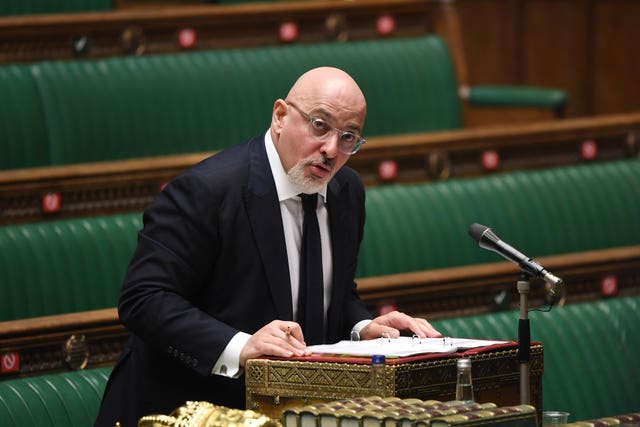Britons face needing a third jab this year amid concerns about the Oxford/AstraZeneca vaccine’s effectiveness against the South African coronavirus variant.
Vaccines minister Nadhim Zahawi was forced to defend the vaccine after a new study in South Africa found it was not effective at preventing mild illness caused by the more infectious mutation.
South Africa has suspended the rollout of the British-designed vaccine to healthcare staff following the results, which have yet to be peer reviewed.
Mr Zahawi urged the public to keep faith with the Oxford jab as scientists working on the vaccine raised the prospect of having a booster dose available by the autumn.
Writing in the Daily Telegraph, the minister said: “While it is right and necessary to prepare for the deployment of an updated vaccine, we can take confidence from the current roll out and the protection it will provide all of us against this terrible disease.
“We need to be aware that even where a vaccine has reduced efficacy in preventing infection there may still be good efficacy against severe disease, hospitalisation, and death. This is vitally important for protecting the healthcare system.”
It comes as:
– The number of people in the UK who have received a first dose of a vaccine passed the 12 million mark, with jabs administered at a rate of almost 1,000 per minute during a one hour period over the weekend.
– A new Scottish record for vaccines was set, with the number of initial jabs given in one day passing 50,000 for the first time.
– Migrants living in the UK unlawfully will be given an amnesty in order to get vaccinated, the Daily Mail reported.
– People living in Northern Ireland who cross the Irish border without a reasonable excuse face a 100 euro fine from Monday.
– People who have been given both doses will be able to request their vaccine record from their GP to allow them to go on holiday to countries where immunity passports are required, Mr Zahawi confirmed.
Scientists agreed more research is required into the level of protection the Oxford vaccine affords against the South African variant but some expressed concern over the preliminary findings from the southern hemisphere.
AstraZeneca said on Sunday the fact the study into the E484K mutation involved 2,000 people who were mostly young and healthy meant it had “not been able to properly ascertain” whether it prevented against severe illness and hospital admission.
But the Anglo-Swedish pharmaceutical giant said it believed “our vaccine will still protect against severe disease” as the neutralising antibody activity is “equivalent to other Covid-19 vaccines that have demonstrated activity against more severe disease”.
Professor Sarah Gilbert, the Oxford vaccine’s lead researcher, said her team was working on having an adapted version of their jab that could tackle the South Africa mutation – of which cases have been found in England – “available for the autumn”.
She said: “This year we expect to show that the new version of the vaccine will generate antibodies that recognise the new variant. Then it will be very much like working on flu vaccines. It looks very much like it will be available for the autumn.”

Mr Zahawi said he and Professor Jonathan Van-Tam, England’s deputy chief medical officer, agreed there was likely to be a follow-up jab programme later in the year.
“We see very much probably an annual or booster in the autumn and then an annual (jab), in the way we do with flu vaccinations where you look at what variant of virus is spreading around the world, rapidly produce a variant of vaccine and then begin to vaccinate and protect the nation,” he told BBC One’s Andrew Marr Show.
The Government’s announcement that it had secured 20 million more rapid-result coronavirus tests signalled that the Prime Minister – due to set out his road map for easing restrictions later this month – could be preparing to relax lockdown rules in some settings as daily Covid deaths fell to their lowest level in weeks.
Figures showed that a further 373 people had died within 28 days of testing positive for Covid-19 as of Sunday, bringing the UK total to 112,465.
The lateral flow antigen tests, which can return results in under 30 minutes, are the first British-made tests to be validated by Public Health England in the laboratory and will be deployed to test NHS and care home staff, as well as in schools, universities, and for key workers.
But Tim Spector, professor of genetic epidemiology at King’s College London, said the impact of Covid was likely to be felt at large gatherings long after lockdown was over.
He told Times Radio: “I can’t see us suddenly having another Cheltenham Festival with no regulations again, I can’t see us having massive weddings with people coming from all over the world.
“I think for the next few years those days are gone.”




Comments: Our rules
We want our comments to be a lively and valuable part of our community - a place where readers can debate and engage with the most important local issues. The ability to comment on our stories is a privilege, not a right, however, and that privilege may be withdrawn if it is abused or misused.
Please report any comments that break our rules.
Read the rules here